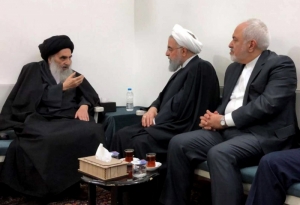Sistani calls for disarming militias after a spiritual meeting
 Najaf (Iraq) – A statement issued by the Supreme Shiite cleric in Iraq, Ayatollah Ali al-Sistani, on his demand to limit arms to the state, as the most important challenge facing the state, raised questions about its significance.
Najaf (Iraq) – A statement issued by the Supreme Shiite cleric in Iraq, Ayatollah Ali al-Sistani, on his demand to limit arms to the state, as the most important challenge facing the state, raised questions about its significance.
The statement quoted Sistani as saying that “the most important challenges facing Iraq at this stage is to combat corruption and improve public services and arms inventory by the state and its security services,” expressing his hope that the Iraqi government to make acceptable progress in these areas.
It is noteworthy that the armed militias classified internationally in terrorist groups have independent headquarters in Iraqi cities and still retain their weapons after the restoration of the city of Mosul from the organization of Dahesh, and received financial support and armament of the Iranian Revolutionary Guards.
These Iraqi militias owe allegiance to Iran’s supreme leader Ali Khamenei and under the supervision of Qusem Qulaimani, commander of the Qods Force.
Sistani welcomed “any step to strengthen Iraq’s relations with its neighbors according to the interests of both parties and on the basis of respect for the sovereignty of States and non-interference in their internal affairs.”
Iraqi political sources expressed their surprise that Sistani’s statement would be issued immediately after a spiritual meeting. He knew that the militia file was Sulaymani, not Rouhani, and that the Iraqi government itself was incapable of disarming the militias.
Sistani’s statement stressed that “regional and international policies in this sensitive region must be balanced and moderate in order to spare their peoples more tragedies and damage.”
An Iraqi political observer wondered if there was a link between the statement attributed to Sistani and his reception to the Iranian president, especially what is related to the talk about the sovereignty of states, which is not found in Iran’s relationship with Iraq, where Iran dominates the militias that owe their ideological allegiance to the Supreme Leader of Iran, Sulaimani.
The observer said in a statement to the “Arabs”, “The paragraph on the weapon appeared as if it had been included in the statement because it is not applicable for two reasons. First, it is the Iraqi government that funds the militias. The second reason is that these militias are directly protected by Iran. That paragraph may not be aimed at popular mobilization, but at what the popular crowd calls the illegal militias. The militias that have been dispensed with their services recently. “ The Arabs
